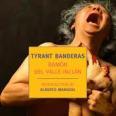Valle-Inclan’s work is considered the first novel about Latin dictatorships, and was acknowledged by Garcia Marquez as the inspiration for his book, The Autumn of the Patriarch.
He was born in a village in Galicia in 1866, to an Impoverished aristocratic family, a background he shared with the Breton symbolist writer Villiers de l’Isle Adam, who is best known for his fantastical novel Against Nature (A Rebours, 1884). Both writers belonged to literary movements which reacted against the naturalistic tradition of 19th century novels – Symbolisme in France and Modernismo in Spain, which V-I wrote a manifesto article for in 1902, (E. Lavaud (1974): V-I, Theoricien de Modernisme). Tyrant Banderas is written in a Modernist style which prefers subjectivism and irrationality to positivism and rationality, but it also belongs to the post-war world of the 1920’s. V-I had been changed by his experiences as a war correspondent in 1916, and in his later writing he developed a unique style which he called Esperpento, a Spanish word meaning a grotesque and frightening person as well as a piece of nonsense.
His Modernist/Symbolist aesthetic is thus applied not to the reclusive world of a literary aristocrat, but as a way of representing dictatorships as grotesque distortions of the normal world. Grotesque but not absurd, since V-I saw them as mathematical transformations similar to those created by the distorting mirrors of a funfair.
The Colonial regimes of Latin America, and often also their successor elites, are doubly against nature – through imposing an alien culture on indigenous peoples in another continent, but also through clinging to a caricature of their own ‘nature’ in the form of 19th century European rationalism.
In V-I’s view the tragic meaning of Spanish history could only be conveyed in terms of heroes who are systematically deformed as in distorting mirrors.
With the exception of the downtrodden peasant Scarface Zac, none of the characters in the novel are portrayed sympathetically. Banderas himself constantly drools green spittle and is referred to as The Mummy, rather than by name.
Peter Bush presented his new translation, the first in English since 1929 at the Cervantes Institute in London in November, describing the difficulties of rendering a work which employed varieties of Spanish from many countries. In the English version he has chosen to mix US and British expressions to convey the author’s intention in creating comedy and incongruity, for readers “who don’t use dictionaries”.















